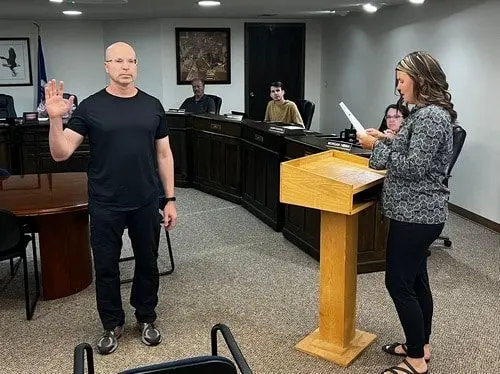The Crookston City Council met on Tuesday evening in the City Hall Council Chambers and quickly met with the only items in the consent agenda.
The first item was the oath of office for new Ward 1 Councilman Joseph Shostell. (pictured at the bottom of the page)
The council unanimously approved the consent agenda with the approval of the special city council meeting and regular meeting minutes on August 18 and the special council meeting minutes from August 25, along with the bills and disbursements for $295,739.11.
The council also approved Carol Gregg’s appointment to the Crookston Park Board and Darin Selzler’s appointment as interim City Administrator.
Also approved in the consent agenda was AMS’s cement license renewal and the satisfaction of special assessments for Lot Eleven (11) in Block Five (5), Evergreen Estates Subdivision owned by Tom Amiot. Outgoing City Administrator Jeff Shoobridge explained what exactly that meant. “What that means is we just needed a council action to ratify what had already happened several years ago. Somewhere along the lines, there was a cloud on the title with the special assessment that needed to be cleared,” said Shoobridge. “It was cleared up originally. It just wasn’t documented appropriately several years ago. This council action then documents it so that he can move forward.”
After the council meeting, the council and department heads held a budget workshop meeting and discussed the 2026 budget. After over an hour of budget discussion, the council agreed on two things. The first item was they want to keep the levy at a 0% increase next year after two hefty increases. The City received $1.1 million reimbursement from the Ag Innovation Center after it closed down. “We want to be able to balance our budget and provide services to our residents, but right now the goal is to keep that 0% increase, the same dollar amount as last year, and try to increase the efficiencies and try to find other ways to supplement the budget,” said Shoobridge. “I’m proud of some of my department heads and the city’s department heads. For example, Greg Hefta, our building official, signed a contract with another local community where we’re providing official building services for the city of Ada, which helps build our revenue while utilizing excess capacity. So we really are working hard to try to find those niches where we can build that extra capacity and keep things as stable as we can for the residents of the city.”
The second thing that was decided was four more budget meetings because all cities have to have the preliminary levy by September 30. Councilmember Morgan Hibma suggested they have four budget meetings and Mayor Dale Stainbrook agreed as that is what they have done in the past. The rest of the council agreed it would be a good idea and the meeting schedule is below –
Monday, September 8, at 5:30 p.m. – Admin, Finance, Mayor, and City Council budgets
Wednesday, September 10 at 5:30 p.m. – Parks and Rec budget
Monday, September 15 at 5:30 p.m. – Community Development, Police, and Fire budgets
Wednesday, September 17 at 5:30 p.m. – Public Works
That leaves September 22 and 29 as possible budget discussion meetings if they are needed to finalize the preliminary levy. “They’ll be going through the department line items, which are important. It’s good to look through them and see them for an understanding. I’ve worked with Holly, our finance director, and each of the department heads. We’ve gone through each of these lines, and we’re confident we’ve cut where we can and improved those efficiencies,” said Shoobridge. “it really comes down to being able to find a budget that we can start building our reserves and funding our capital needs as the city moves forward. And services or programs will probably have to be cut in order for you to do that. Or at least, you know, something’s going to have to be. Something has to be done, but the good news is the staff and the council are committed to providing the best amenities that we can to the residents.”
The items that will be the most scrutinized in the remaining budget meetings will be capital expenses. “A lot of the capital items will be up for discussion. The operating budgets are fairly straightforward,” said Shoobridge. “It’s really the prioritization of the capital, what high-risk items are, and what more routine items are.”
